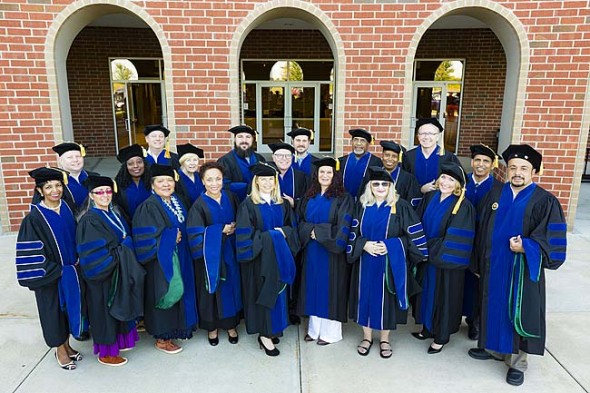AU leadership program grows
- Published: September 10, 2015
Now in its 15th year, the Antioch University doctorate degree in leadership and change has graduated about 170 men and women who are schooled in leadership in the context of the historic Antioch values of racial, economic and social justice.
And recently, the leadership program broadened its scope to include a center for nondegree continuing education that also reflects those values. Together, the doctoral program and continuing education center comprise the new Antioch University Graduate School for Leadership and Change, university leaders announced last month.
The new graduate school is an overarching umbrella for the doctoral program and its related activities, which will include training, consulting and educational institutes focused on the fields of progressive leadership and change, according to Laurien Alexandre, director of the program and provost of Antioch University.
“The school is about training and working with those who are leading change to better our workplaces and communities,” she said in a recent interview.
For example, the nondegree continuing education center recently provided training in leadership issues for the United Way of Houston, and also created a five-part Webinar for the Rainbow Health Care Leadership organization, addressing health care issues for the LGBTQ community.
The new expanded program reflects the growth of the leadership and change doctoral program, according to Alexandre. Earlier this month, the program graduated 23 new Ph.D.s at its annual commencement ceremony held at Antioch University Midwest. The new graduates, who hailed from 14 states, Canada and Nigeria, joined the current alumni of the program and 160 students currently pursuing doctorates. This year, the program also added a new health care component.
“It’s been incredibly successful,” Alexandre said of the Ph.D. program.
The program’s success can be linked to the uniqueness of several program aspects, Alexandre said, starting with the nature of its students. In line with the Antioch emphasis on valuing diversity, about 50 percent of leadership program graduates are students of color, and 80 percent are 40 or older.
“There’s a focus on active practitioners,” Alexandre said. “It’s for practitioners who want to design original research that can contribute to change in their field.”
Along with an unusual student body, the program’s education delivery method is also unique, Alexandre said. With students required to take part in three- to five-day residencies at different Antioch University campuses four times a year, the program offers a hybrid model of online and traditional classroom learning tailored for those with busy lives and careers who also want the sense of community that comes from being part of a cohort. In the periods between the face-to-face learning of residencies, students benefit from “robust virtual communication” between teachers and students, and students between themselves, Alexandre said.
The program is also unusual in that it doesn’t use a course-based curriculum. Rather, the leadership curriculum is structured around written demonstrations that show the acquisition of knowledge and skills about the study, research and practice of leading change, according to Alexandre. Students have 16 required demonstrations of learning sequenced through the four years of the program, with examples being assignments such as a “Nature of Leadership” literature review, a real-world change project, a critical analysis of research methods in one’s field and a final dissertation, she said.
Students work with one of the program’s 10 full-time faculty members to determine their specific learning outcomes and objectives.
As well as an expansion, the program is experiencing a major transition this year with the retirement of Al Guskin, former president of Antioch College, chancellor of Antioch University, and co-creator, with Alexandre, of the Leadership and Change program.
Guskin sparked the program’s creation when he brought together AU leaders in the mid-1990s to consider “the next big ideas about Antioch,” according to Alexandre. What emerged from the ongoing gatherings was a vision of a university-wide Ph.D. program with a focus on progressive change, which turned into the Leadership and Change program.
“Al was a visionary about higher education,” she said.
Guskin taught in the program until announcing his retirement this summer.
The program has gained attention, and when Antioch University Chancellor Felice Nudelman came to her position several years ago, she was already familiar with the school’s doctoral program, she said in a recent email.
“It is truly one of the most exceptional education programs I have ever seen,” Nudelman wrote, adding that “one of my great joys is to read the student dissertations and explore new ways of thinking about leadership.”
The program worked well for two local alums, including Dr. Sean Creighton, executive director of the Southwestern Ohio Council on Higher Education, or SOCHE, and a member of the Yellow Springs school board. The leadership program “helped me develop into a scholar–practitioner, where I could connect rigorous academic learning and research to practical, real challenges in my workplace and across my interest areas of higher education, public service and social responsibility,” Creighton wrote in an email, also stating that the program “challenged me to reflect on my past, present and future and how you mature as a leader. Further, I wanted to be in an environment that valued community and Antioch does that better than any institution.”
Lisa Kreeger of Yellow Springs, a registered nurse with a background in health care, also successfully completed the doctoral program. Especially valuable to Kreeger was the program’s emphasis on bringing together people of different backgrounds and experience.
“This diversity, as well as the combination of intensive face to face time, independent research, time with the faculty and online interaction, really made the curriculum tremendously valuable,” she wrote. “Ultimately, we were all studying leadership and change without strong industry boundaries. And that was magical.”
The Yellow Springs News encourages respectful discussion of this article.
You must login to post a comment.
Don't have a login? Register for a free YSNews.com account.











No comments yet for this article.